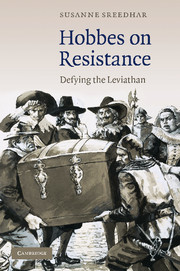4 - Is Leviathan a “rebel's catechism”?
Published online by Cambridge University Press: 04 April 2011
Summary
On a natural reading of his philosophy, Hobbes is a man of extremes. His positions on various questions often come in the form of absolutes. He defends absolute materialism and absolute moral subjectivism, and he maintains that the condition of man outside civil society – the “state of nature” – is absolutely terrible. The political authority of the sovereign is also absolute, and rebellion by subjects against their political order is absolutely prohibited.
Hobbes makes it easy to take his positions in this way, and the interpretation of Hobbes as advancing an absolute prohibition on rebellion finds a great deal of explicit textual support. For example, he argues against rebellion saying that it is “but war renewed.” Indeed, at times Hobbes writes as though his entire project, at least in De Cive and Leviathan, is to demonstrate the illegitimacy and imprudence of rebelling against an established and stable political order. But this view strikes our modern eyes as implausible. We take it for granted that rebellion is sometimes justified, even though there is much disagreement about the specific circumstances that justify it. Read as an absolute prohibition, Hobbes's position on rebellion is, thus, easily dismissed; though this dismissal is usually accompanied by a sympathetic nod, acknowledging that this unreasonable view is understandable given the political climate in which Hobbes wrote. After all, he lived through the rebellion against King Charles I and the English Civil War, and was, therefore, acutely aware of the potentially disastrous consequences of rebellion.
- Type
- Chapter
- Information
- Hobbes on ResistanceDefying the Leviathan, pp. 132 - 167Publisher: Cambridge University PressPrint publication year: 2010



